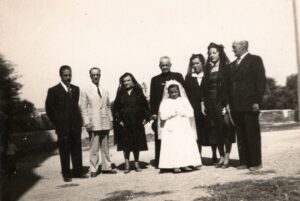
August, 1950. We are all lined up, squinting into the sun, by the shrine of Our Lady of the Orchards, outside my mother’s village in Catalonia. I have just made my First Communion, and my father’s family has come from Barcelona to celebrate. There, assembled behind me, are the people—except for Mossèn Ignaci, the priest, who is ancient, kindly, and has a stutter— whose DNA I carry.
At the far left is my father, Lluís, for once without his violin or his concert tails, looking solemn despite his sense of humor, which he passed on to me along with his musician’s ear. Next to him stands his father, Mateu, from whom I inherited a need for silence and visual order—when he came to visit, he would first straighten the paintings on our walls and then give us each a kiss. For my First Communion he gave me a gold ring, which he called—the only joke I ever heard him make—“a bracelet for the finger.” My tiny paternal grandmother, Dolors, is by his side, still wearing mourning for the son she lost during the Spanish Civil War. She is the one with the original music gene, but I mostly remember her sadness, and that she smelled like almonds.
My mother’s mother, Magina, is on Mossèn Ignaci’s other side. She ran the farm and supervised the sharecroppers and her husband’s veterinary practice, and made sure that people paid their bills. She created amazing dolls for me out of fabric scraps, and would take me into the hayloft to show me litters of newborn kittens (before drowning them when I wasn’t watching). But despite the dolls and the kittens her constant anxiety was palpable to me in wordless ways. Before we left for church that day, she hung around my neck a medal with an ivory bas relief of the Madonna framed in gold.
Next to her, my pretty mother, Francina, is relieved that the dressmaker finished my petticoat and dress in time for the ceremony, and that the veil that she herself spent the summer embroidering is staying on my head. From her mother she inherited a clear head, a talent for worrying and for telling stories, and a tendency to take everything seriously.
Her father, Josep, is beside her. He is a member of the James Herriot generation, the last vets to tend to the horses, mules, and donkeys that worked the land. Although he is only in his fifties he is bald and toothless, and refuses to wear dentures or attend Mass (though he makes an exception on this day). Much to my grandmother’s distress, he is constitutionally unable to demand payment from peasants who claim to be in financial straits. But this once saved his life. During the early days of the war, when anarchist militias would rush into villages and kill the landowners, my grandfather’s grateful clients would warn him in advance, and he would flee to another town and hide until the danger was over.
There they are, my six DNA providers. They had little in common with each other. My father’s family came from the city, my mother’s from the country. Some of them were almost totally silent (my father’s father), while others talked non-stop (my mother). She studied law and classics, while my father lived in a world of rhythm and melody. But they all had one thing in common, something that marked them deeply and that I could sense from my earliest childhood although they never discussed it in my presence: the three years of the Spanish Civil War. Now that I know that the epigenome can change due to environmental factors and these changes can be transmitted through the generations, I am beginning to understand the gray layer of anxiety that underlies the humor and logic, the sensitive eyes and ears, and the fondness for all creatures great and small that those six good people in the photo passed down to me.


5 Responses
Thank you for sharing your family and your memories.
I don’t know why mine are so fuzzy in comparison – we have a lot in common – but though I can remember walking many long blocks to the house of a friend of my parents to borrow The Complete Sherlock Holmes (once for each volume), and the street, my specific memories of grandparents are limited to very few, including how my grandmother (Mamina) liked us to brush her hair, which had been copper-colored when she was young, as proven by a thick copper braid in a hat box!
I should write them down, and gather them from my sisters, and I don’t – and none of them have made the effort, either.
Oh Lord, the cut-off braids wrapped in paper and saved in a box! If that’s not a memory worth writing about, I don’t know what is (I have it too, but I cede it to you because you remembered it first!).
Now I’m wondering what happened to Mamina’s braid!
I left Mexico at 19, never to return to live there, but I do have four younger sisters who live in Mexico City – I wonder if one of them has it.
Wow. Thank you.
And thank you for reading, my friend.